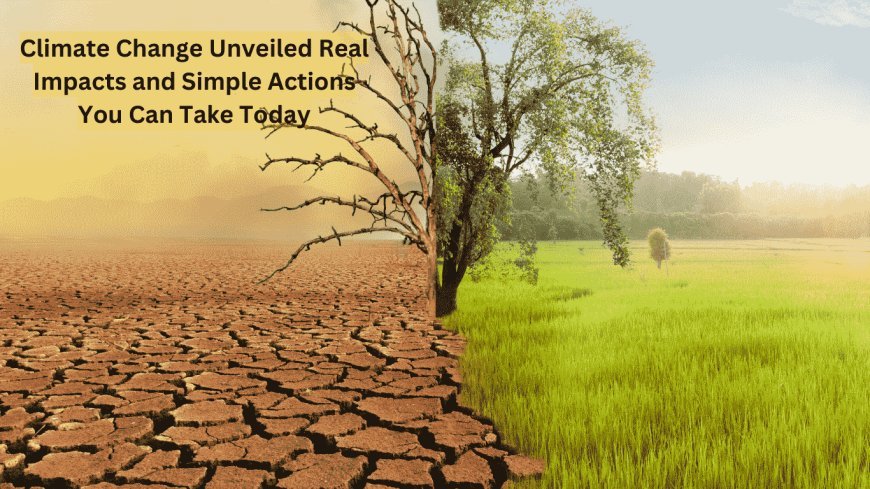Climate Change Unveiled: Real Impacts and Simple Actions You Can Take Today
Learn about the real impacts of climate change on our planet and simple, actionable steps you can take to make a difference. Together, we can fight climate change and protect our future.

Excerpt Introduction:
This article explains climate change's consequences and gives easy, effective activities you can do to make a difference now.
Climate Change Unveiled: Real Impacts and Simple Actions You Can Take Today
Everybody talks about climate change, but what does it mean for ourselves and the planet? Importantly, what can we do? This blog discusses climate change's real-world effects, from melting glaciers to severe weather, and offers easy ways to help. Everyone can learn about the environment, from environmentalists to beginners. Begin!
What Is Climate Change and Why Does It Matter?
Simply put, climate change is long-term temperature and weather changes. Though volcanic eruptions and solar radiation have historically affected Earth's climate, the present catastrophe is mostly caused by human activities—specifically the combustion of fossil fuels like coal, oil, and natural gas. This releases greenhouse gases like CO2 and methane, trapping heat in the atmosphere and raising global temperatures.
How come you care? Because climate change goes beyond polar bears and ice caps. It concerns you, your town, and our globe.
The Real Impacts of Climate Change
Let's examine how climate change is influencing our world and life.
1. Rising Temperatures
Global temperatures have risen 1.1°C (2°F) from pre-industrial times. Although this warming is minimal, it has major implications, including:
- More severe heatwaves.
- Seasonal agricultural threats.
- Power networks strain due to cooling energy demand.
2. Melting Ice and Rising Sea Levels
Arctic sea ice shrinks 12.6% each decade, and glaciers melt globally. Sea levels have risen 8 inches (20 cm) since 1880 due to this. Sea level rise threatens coastal communities, displacing millions and costing billions.
3. Extreme Weather Events
- As oceans warm, hurricanes and cyclones get stronger.
- Water supply and crops are more affected by droughts.
- Higher rainfalls flood infrastructure and residences.
4. Impact on Ecosystems and Wildlife
- Polar bears, coral reefs, and migratory birds attempting to adapt.
- Over 1 million species are endangered at an alarming rate.
5. Human Health Risks
- Heat-related diseases and fatalities are growing.
- Forest fires and pollutants are lowering air quality.
- As temperatures warm, mosquito-borne illnesses like malaria spread.
Why We Need to Act Now
Delaying climate change action will worsen its impacts. Global warming must be limited to 1.5°C (2.7°F) over pre-industrial levels to prevent catastrophic repercussions, according to the IPCC. Reduce world emissions by 45% by 2030 and attain net zero by 2050.
The good news is that millions of modest acts can have enormous effects. See what you can do.
Simple Actions You Can Take Today to Fight Climate Change
You can help without becoming a scientist or activist. Some simple and effective strategies to tackle climate change:
1. Reduce Your Carbon Footprint
Your daily greenhouse gas emissions are your carbon footprint. Minimize it:
- Drive less: walk, bike, carpool, or use public transit instead.
- Saving energy: utilize LED lamps, disconnect gadgets, and utilize energy-efficient appliances.
- Fly wisely: Donate to carbon offset programs or fly direct.
2. Embrace a Plant-Based Diet
The meat and dairy business emits 14.5% of global greenhouse gases. Meat reduction may be significant without giving up meat. Try:
- Meatless Mondays.
- Using chicken or beans instead of beef.
- Supporting local, sustainable agriculture.
3. Shop Sustainably
Fast fashion and overconsumption cause pollution and waste. Buy more carefully by:
- Buy secondhand or ethically.
- Restoring garments instead of throwing them away.
- Use reusable bags, bottles, and straws instead of single-use plastics.
4. Conserve Water
Global warming is increasing water shortages. Use less water:
- Use water-saving fixtures and address leaks.
- Stopping the tap while brushing.
- For gardening, collect rainwater.
5. Advocate for Change
Your voice counts. Participate by:
- Electing climate-focused leaders.
- Fostering renewable energy and pollution reduction initiatives.
- Promoting climate change education and solutions.
6. Support Renewable Energy
Install solar panels or switch to green energy. Use a smart thermostat to save energy—even modest modifications may have significant results.
7. Plant Trees and Protect Green Spaces
Trees absorb atmospheric CO2. Contribute to reforestation or plant trees.
Climate Change Success Stories: Hope for the Future
Challenges are frightening, but progress is worth celebrating:
- Renewable energy adoption: wind and solar are currently inexpensive.
- Global cooperation: The Paris Climate Accord unites nations to reduce emissions.
- Innovative technology: carbon capture, electric cars, and sustainable agriculture are advancing.
Every beneficial action, no matter how tiny, helps the world.
Frequently Asked Questions (FAQs)
1. What causes climate change?
Burning fossil fuels, deforestation, and industrial operations that emit greenhouse gases are the main causes.
2. Can one person really make a difference?
Absolutely! Small acts pile up over millions. Systemic change advocacy may boost your influence.
3. What are net-zero emissions?
Greenhouse gas emissions and removal must balance to reach net zero.
4. How do I calculate my carbon footprint?
Carbon Footprint.com and other free web calculators may estimate your emissions based on travel, nutrition, energy usage, and consumption.
Final Thoughts: Together, We Can Make a Difference
We can all help protect our planet for future generations by understanding climate change and adopting easy, effective measures.
Awareness precedes action in transformation. Which step will you take today?

 shofiul
shofiul 





